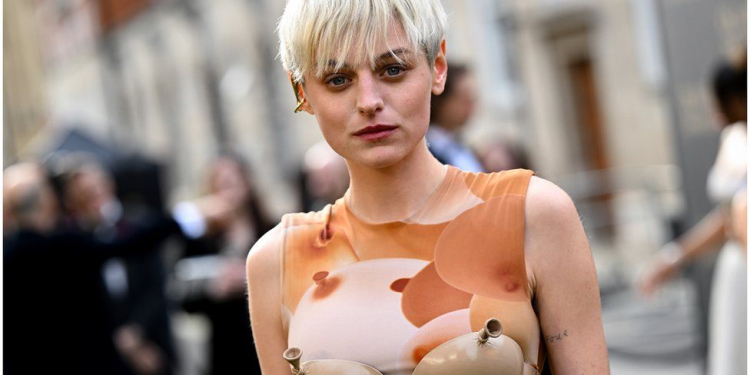The Crown star Emma Corrin has called for the best actor and best actress categories at major film awards to be merged into a single, gender-free one.
“I hope for a future in which that happens,” Corrin said.
The star, who identifies as non-binary and uses they/them pronouns, added: “I don’t think the categories are inclusive enough at the moment.”
The organizations behind the Baftas and Oscars have indicated they are engaged in discussions about the subject.
“It’s about everyone being able to feel acknowledged and represented,” Corrin said.
The 26-year-old previously won a Golden Globe and was nominated for an Emmy for their performance as Princess Diana in series four of The Crown – but that was at a time when Corrin was still accepting, she/her pronouns.
They are starring in two high-profile films this year – My Policeman and Lady Chatterley’s Lover.
“It’s difficult for me at the moment trying to justify in my head being non-binary and being nominated in female categories,” Corrin said.
Reflecting on the fact that they largely play female roles, Corrin wondered: “When it comes to categories, do we need to make it specific as to whether you’re being nominated for a female role or a male role?
“You can discuss awards and the representation there, but really the conversation needs to be about having more representation in the material itself, in the content that we are seeing for non-binary people, for queer people, for trans people, because then I think that will change a lot.
“When those parts come up, meaning more people and more actors are playing those roles then I think there will be more of an urgency with which these questions will be addressed.”
A Bafta spokesperson said the organization was “engaged in proactive and thoughtful consultation on this subject”. The organization behind the Oscars, the Academy, is also believed to be conducting research and holding discussions on the issue.
The debate about gender-free categories is gathering steam, with the music industry leading the way. The Grammys went gender-neutral in 2012, while the Brit Awards merged their male and female solo categories into an artist of the year category this year.
Chart-topper Adele went home with the first trophy. However, in her acceptance speech, she said: “I understand why the name of this award has changed, but I really love being a woman and being a female artist. I do. I’m really proud of us.”
This is a more complicated debate than it looks. While gender-neutral categories are seen by some as socially progressive, they could have unintended consequences and there are several factors to consider.
Firstly, this decision could result in less equality in the long term. The Oscars currently guarantee two male and two female acting winners every year, but a merger could mean it skews one way or the other over time.
Take the most recent winners as an example. It is unlikely Jessica Chastain would have beaten Will Smith if they had been competing in one overarching category.
That is partly because this year’s best actress race was wide open, whereas Smith was considered a dead-cert in his category.
But it’s also because the best picture category tends to have more overlap with the best actor than the best actress. Chastain’s film wasn’t even nominated for the top prize, unlike Smith’s. As a result, women could have a higher hill to climb to score a win.
In the long term, it’s not hard to imagine the outrage if a decision like this led to a repeated loss of recognition for worthy winners, particularly women.


